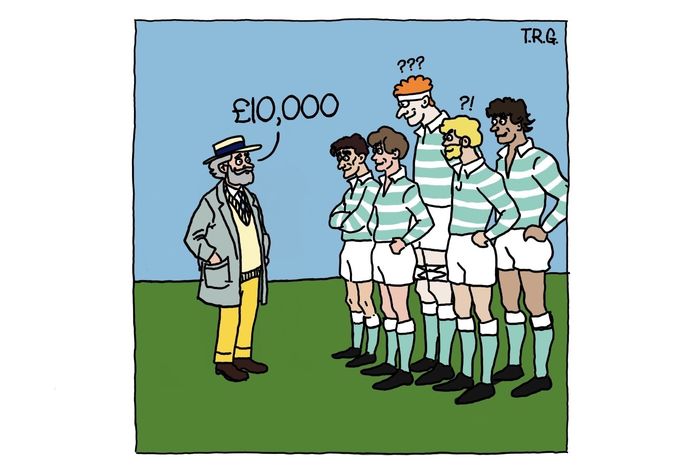More than a man’s game: addressing the gender bias in sports journalism
Ben Lubitsh dissects our nation’s complicated relationship with gender equality in sports

Recently, I fulfilled my monthly duty as an English football fan by reminiscing over our oh-so-nearly perfect summer. Over a couple of drinks, my friends and I shared our sorrows as we recalled in disgust what was another heartbreaking end to a major tournament for the Three Lions.
It’s always after one of those conversations that you think football might never come home again; the painfully long wait since 1966 seems to linger indefinitely. It’s not often, however, that you remind yourself that football actually did come home, less than 3 years ago.
Glory in the Women’s European Championships seemingly deserves only temporary and superficial celebration in this country, whereas the misery of the men could last a lifetime. The value of the latter almost effortlessly bulldozes that of the former.
I’d simply be lying if I were to insist that I don’t participate in this harmful narrative – and this bugs me. Truthfully, however, I think almost all of us do.
“Yet with its slogan-like appeal comes a stone-cold disregard for the Lionesses”
It would be all too easy for us to dismiss this issue (and thus our guilt) with what can just about pass off as unfortunate realism; “the men’s game is simply more popular than the women’s game – shame, isn’t it.” Yet, I think our time is much better spent trying to figure out why it is that (mostly) well-intentioned sports fans are constantly enforcing this tacit sexism. This way, we can make a legitimate attempt to quash it.
While fans possess the opinions, sports media creates the narratives. And it’s these narratives that enforce an already rampant patriarchal culture within the world of sport. Football waiting to ‘come home,’ not to mention the 59 (and counting) ‘years of hurt,’ are catchy ways for broadcasters to cover major football tournaments. Yet with its slogan-like appeal comes a stone-cold disregard for the Lionesses.
We should not be told that we’re ‘waiting’ for anything; we should be reminded and encouraged to further rejoice over this country’s immense recent sporting achievement. Degrading the achievements of female athletes doesn’t just happen on this scale when covering this particular sport, however; it can and does happen in many other sports.
You’d think, for example, that the Williams sisters wouldn’t escape the mind of high-profile sports journalists all too often. Yet twice it has fallen to Andy Murray to shut down sexist reporters and their oblivious questions.
“Notice the subtlety with which such poor broadcasting takes place”
At the 2016 Olympics, Murray corrected BBC broadcaster John Inverdale when the journalist congratulated him for being the first tennis player ever to win two gold medals, overlooking the combined total of eight shared between the Williams sisters. Similarly, Murray was quick to call out another reporter at Wimbledon in 2017, who conveniently used the word ‘player’ to refer merely to male athletes.
Notice the subtlety with which such poor broadcasting takes place, apparent only to those attentive enough to notice it. It is not just for his skills on the court, therefore, that we should all strive to be a little more like Andy.
To be clear, in the same way that we ought to not blindly categorise this issue as an unfortunate consequence of greater popularity in the men’s game, we’d be equally guilty of lazy unaccountability if we pinned this down simply to reporters and other members of the media. Conscious efforts go a long way in tackling subconscious biases, and so it is only this that will suffice if we are to truly confront the issue at hand.
‘Players’ aren’t just male, the World Cup or the Euros don't just refer to the men’s game, and the achievement of a female athlete is just as much of an achievement as that of a male. This is all information that we (hopefully) know, but that we nonetheless fail to treat with the appropriate strictness as we would with any other blatant truths that we care about.
Following the trend of succumbing to sexist media narratives is not a necessity. If we start calling out those who get it wrong, (including ourselves) and make what might seem to be a pedantic effort to enforce gender equality in sports, fan culture will change for the better, and will be inevitably followed by the media. This way, we can continue to enhance the progress of women’s sport in a far more meaningful way.
Want to share your thoughts on this article? Send us a letter to letters@varsity.co.uk or by using this form.
 News / Eight Cambridge researchers awarded €17m in ERC research grants27 December 2025
News / Eight Cambridge researchers awarded €17m in ERC research grants27 December 2025 News / Clare Hall spent over £500k opposing busway 24 December 2025
News / Clare Hall spent over £500k opposing busway 24 December 2025 Comment / League tables do more harm than good26 December 2025
Comment / League tables do more harm than good26 December 2025 Comment / The ‘class’ of Cambridge24 December 2025
Comment / The ‘class’ of Cambridge24 December 2025 News / Caius mourns its tree-mendous loss23 December 2025
News / Caius mourns its tree-mendous loss23 December 2025









